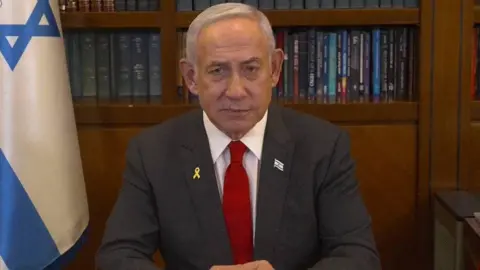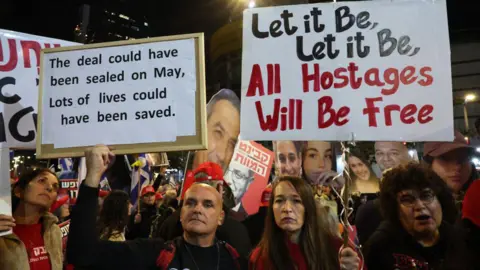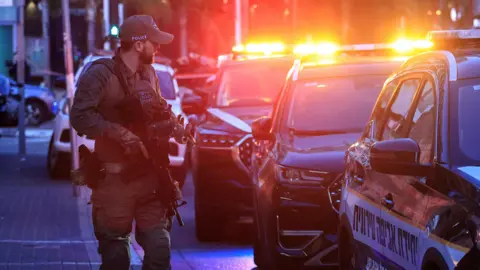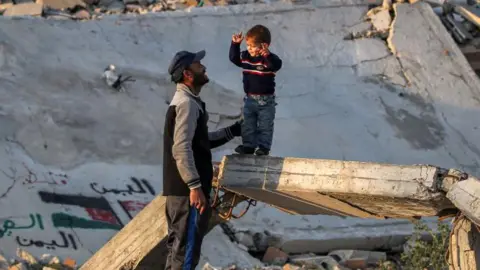Benjamin Netanyahu issued a warning before the Gaza ceasefire
 Office of the Prime Minister of Israel
Office of the Prime Minister of IsraelIsraeli Prime Minister Benjamin Netanyahu said that his country is ready to continue the war with Hamas if negotiations for a second cease-fire agreement fail.
Hours before Sunday’s start, Netanyahu said in a televised speech that the ceasefire was temporary and that Israel reserved the right to continue its attacks on Gaza – and to do so with the support of US President Donald Trump.
What Netanyahu described as the success of Israel’s military campaign in the past 15 months – including the assassination of Hamas leader Yahya Sinwar.
“We have changed the face of the Middle East,” Netanyahu said, adding that Hamas is now completely “alone.”
The ceasefire will come into effect at 08:30 local time (06:30 GMT).
Before Saturday’s speech, Netanyahu said Israel would not implement the deal until it received a list of hostages to be released by Hamas.
“Israel will not tolerate violations of the agreement,” he said.
A list of the 33 hostages expected to be released by Hamas has been published by Israeli media, but nothing has been confirmed by the authorities.
But Israeli officials said they have not yet received the names of the three hostages who will be released on Sunday.
Meanwhile, Israel has continued its airstrikes on Hamas and Islamic Jihad positions in Gaza – killing more than 120 people since the deal was announced on Wednesday, Hamas officials said.
In the next few weeks, the 33 hostages are to be released in exchange for 1,890 Palestinian prisoners. According to the agreement, Israel will begin withdrawing its troops from Gaza.
It is not clear where the first hostages will be transferred. A senior Israeli military official said three reception areas had been set up near the northern, central and southern Gaza borders.
Earlier, a source close to Hamas told Agence France-Presse that the first three hostages to be released were women.
 Getty Images
Getty ImagesTalks about the second ceasefire agreements will begin on the 16th of the first phase and will focus on “ending the war permanently”.
The details of the second phase of the deal are still uncertain, but it is expected that the remaining hostages, including men, will be released at this stage as many Palestinian prisoners held in Israeli prisons are freed.
There will also be a complete withdrawal of Israeli troops from Gaza. It is also known that Hamas police – who are unarmed unless absolutely necessary – manage the return of hundreds of thousands of displaced Palestinians to northern Gaza.
The third and final phase involves the reconstruction of Gaza – something that could take several years – and the return of the remaining hostages.
friday night, After hours of negotiations, the Israeli government approved a ceasefire and the release of the hostages.
Two far-right cabinet ministers, including National Security Minister Itamar Ben-Givir, objected.
The extended structure of the agreement is also causing anxiety and division among the families of the hostages. Some are afraid that relatives will be left behind in Gaza after completing the first stage.
On Saturday night, thousands of protesters gathered in Tel Aviv to mark the first phase of a government ceasefire and demand the release of more hostages.
“We could have saved the lives of 200 soldiers and more than 10 hostages,” Gal Alkalay, a member of the Forum for Hostages and Missing Families, told Reuters news agency. People died needlessly because the government “made a decision and waited for Trump,” she added.
 Reuters
ReutersSeveral people were injured in an attack near a Tel Aviv restaurant earlier Saturday, Israeli police said. It is said that the person who carried out the attack was shot and killed.
The suspect came to Tel Aviv “illegally” from Tukarm in the occupied West Bank, Israeli media reported.
 Getty Images
Getty ImagesAfter the ceasefire was announced on Wednesday night, there was no peace for the Palestinians in the Gaza Strip.
The Palestinian Ministry of Health said 123 people – including dozens of women and children – have been killed in attacks since then.
At least five members of a family were killed when Gaza’s Hamas-run Civil Defense Agency struck their tent in southern Gaza’s Khan Yunis on Saturday, AFP reported.
On Thursday afternoon, the Israeli military said it had struck 100 Hamas and Islamic Jihad fighters among several “terrorist targets” struck in Gaza, Reuters news agency reported.
On October 7, 2023, an unprecedented cross-border attack killed nearly 1,200 people and took 251 hostages, launching the Israeli military’s campaign to eliminate Hamas, which Israel, the United States and others have designated as a terrorist organization. .
Since then, 46,899 people have been killed in Gaza, according to the state’s Hamas-run health ministry. 2.3 million people have been displaced, most of them have been displaced from their villages, there is massive destruction, and in the fight to help the needy, there is a huge shortage of food, fuel, medicine and shelter.








